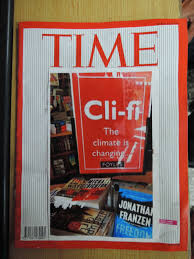The Digital Reader sends us a report from The Conversation on the phenomenon, which appears to have been introduced as a concept in 2008 by American climate activist Dan Bloom. Dissent Magazine had a useful survey article on it in 2013. Wikipedia, which is silent on the origin of the term, assures us that “Hundreds of universities worldwide now offer climate-change fiction courses that deal with both literature and film.”

Seems to have made it to the cover of Time in March 2014. I should pay attention!
As to whether cli-fi really does represent a full-blown genre, I [await the response from the publishing industry's senior editors and CEOs in New York and London].
Still, if it makes fans happy to live with cli-fi, what harm’s done? For such, there’s a Twitter hashtag, #clifi, created by UK PR maven Lisa Devaney, and a Facebook Cli-fi community. For novices, keen to engage with the phenomenon, The Guardian provides a reading list of 10 YA cli-fi books to get started on, while Goodreads hits you over the head with 132 titles.
h/t Richard Horlick
No comments:
Post a Comment